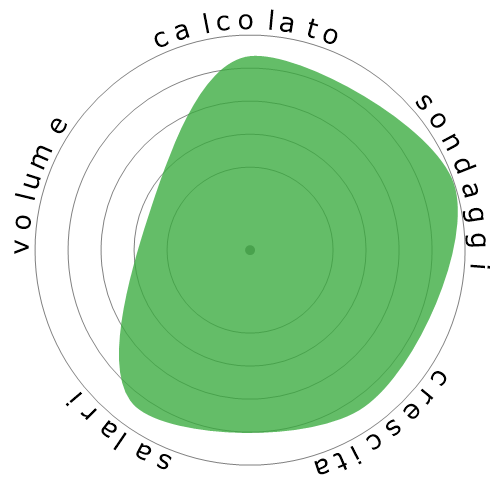Veterinari
Dove Vorresti Andare Prossimamente?
Oppure, esplora questa professione in maggiore dettaglio...


Cosa mostra questo fiocco di neve?
Cos'è questo?
Valutiamo i lavori utilizzando quattro fattori. Questi sono:
- Possibilità di essere automatizzati
- Crescita del lavoro
- Salari
- Volume di posizioni disponibili
Questi sono alcuni aspetti chiave da considerare quando si cerca un lavoro.
Le persone hanno anche visualizzato
Rischio di automazione calcolato
Rischio Minimo (0-20%): Le professioni in questa categoria hanno una bassa probabilità di essere automatizzate, poiché richiedono tipicamente la risoluzione di problemi complessi, creatività, forti competenze interpersonali e un alto grado di destrezza manuale. Questi lavori comportano spesso movimenti manuali intricati e una coordinazione precisa, rendendo difficile per le macchine replicare i compiti richiesti.
Ulteriori informazioni su cosa sia questo punteggio e su come viene calcolato sono disponibili qui.
Sondaggio degli utenti
I nostri visitatori hanno votato che c'è una bassa probabilità che questa professione sarà automatizzata. Questa valutazione è ulteriormente supportata dal livello di rischio di automazione calcolato, che stima una possibilità di automazione del 7%.
Cosa pensi sia il rischio dell'automazione?
Qual è la probabilità che Veterinari venga sostituito da robot o intelligenza artificiale nei prossimi 20 anni?
Sentimento
Il seguente grafico viene mostrato dove ci sono abbastanza voti per produrre dati significativi. Visualizza i risultati dei sondaggi degli utenti nel tempo, fornendo un'indicazione chiara delle tendenze di sentimento.
Sentimento nel tempo (trimestrale)
Sentimento nel tempo (annuale)
Crescita
Il numero di offerte di lavoro per 'Veterinarians' dovrebbe aumentare 19,1% entro il 2033
Occupazione totale e stime delle offerte di lavoro
Le previsioni aggiornate sono previste per 09-2025.
Salari
Nel 2023, il salario annuo mediano per 'Veterinarians' era di 119.100 $, o 57 $ all'ora.
'Veterinarians' hanno ricevuto un salario 147,8% superiore al salario mediano nazionale, che si attestava a 48.060 $
Salari nel tempo
Volume
A partire dal 2023 c'erano 78.220 persone impiegate come 'Veterinarians' negli Stati Uniti.
Questo rappresenta circa il 0,05% della forza lavoro impiegata in tutto il paese
In altre parole, circa 1 su 1 mille persone sono impiegate come 'Veterinarians'.
Descrizione del lavoro
Diagnosticare, trattare o ricercare malattie e lesioni degli animali. Include veterinari che conducono ricerca e sviluppo, ispezionano il bestiame, o si prendono cura di animali domestici e da compagnia.
SOC Code: 29-1131.00
Commenti (56)
In conclusion, STOP BEING LAZY! STUDY, WORK, and use AI to help in minimal cases, not in every aspect of your life.
Moving on. When you mention determining the age of a stray dog, you don't necessarily need to know their exact age to provide treatment or make certain diagnoses. As for your comment about "probably not knowing how much to feed each one," AI and robotics are astonishingly accurate in this aspect. They'll likely always have more data and accuracy than we do. And the notion that "they can't bathe them because they are robots"? Well, we've had waterproof robots for quite some time now.
So, yes, it seems full automation is on the horizon!
Those apps are just going to give rise to pet owners who doubt the doctor's diagnosis, and they are going to make irresponsible decisions thinking that they can treat their pets' ailments. In fact, it has already happened many times.
I work at a veterinary clinic, and there have been many "self-proclaimed veterinarians" with a degree in Google misdiagnosing their pets and giving harmful medications, such as feeding paracetamol to their dogs with high fever.
The app should be restricted to be used by licensed veterinarians and veterinary students, so as to prevent any misinformed or uneducated pet owners from misinterpreting or abusing the information from the apps.
In addition, some owners may have received the correct diagnosis from the app, but may proceed with the wrong treatment. A rise in antibiotic resistance will be observed when owners simply use antibiotics without understanding its consequences.
In fact, this is already happening without the involvement of AI. There are many online sellers selling antibiotics, and even some irresponsible people selling sedatives online, labeling such medications as "cat/dog fever medication" or "cat parvovirus medication".
Rispondi al commento